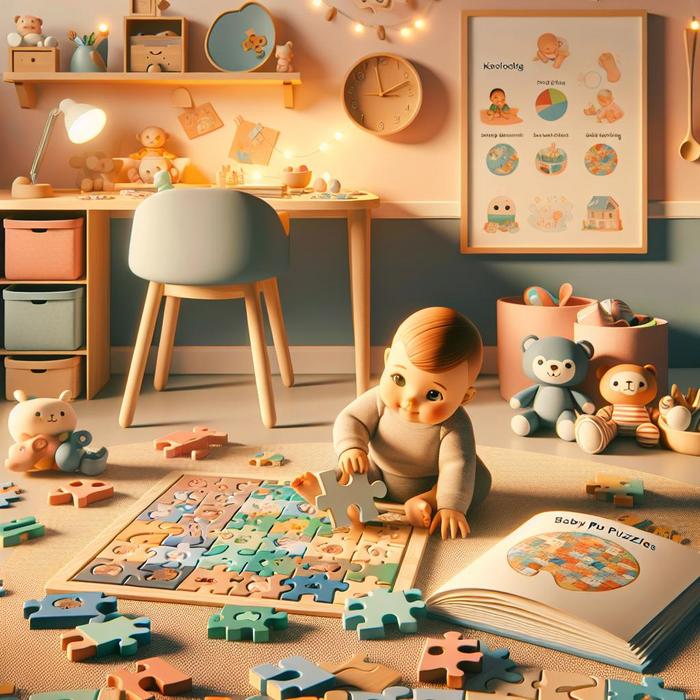Unlocking Potential with Baby Puzzles
Want to give your child a boost in cognitive development? Incorporating baby puzzles into their playtime can be an effective, engaging, and enjoyable way to do so. Creating a safe and engaging space for your child to play and learn is vital for their growth and development. This process is made even more exciting and beneficial when you introduce engaging activities, such as baby puzzles, into the mix.
The Power of Baby Puzzles in Cognitive Development
According to the Help Me Grow Minnesota, cognitive development involves how a child thinks, explores, and figures things out. It includes skills such as memory, problem-solving, and attention. Baby puzzles are not just brain-boosting games; they present challenges that foster these cognitive skills in a fun and interactive way.
- Problem-solving: With puzzles, your child gets an opportunity to use their critical thinking skills. Each piece they fit in place brings a sense of accomplishment that boosts their confidence and fosters their problem-solving abilities.
- Memory: Recalling the right pieces to fit together helps to improve your child’s memory. This frequent memory exercise during playtime gradually enhances their brain’s capability to store and retrieve information.
- Attention: Puzzles require a level of concentration and focus. This practice of prolonged attention during puzzle play helps improve your child’s overall attention span.
Baby Puzzles We Loved
Selecting the right baby puzzles for engaging activities is crucial. They need to be age-appropriate and stimulating enough to capture your child’s interest. Here are a few that our baby loved:
- Wooden Shape Puzzles: These simple puzzles are fantastic for teaching shapes and colors. They require the child to match each piece to the right slot, challenging their problem-solving skills.
- Alphabet Puzzles: Alphabet puzzles are an amazing way to introduce your child to the letters of the alphabet. They are engaging games that also lay the groundwork for early literacy skills.
- Number Puzzles: These puzzles are an interactive way to teach your child numbers and basic counting. They can help stimulate early math skills while entertaining your little one at the same time.
Puzzle Play: More Than Just Fun
As parents, we might see our children absorbed in play and think that it’s all just for fun. However, considerable learning is happening during this time. According to a study highlighted by the National Institutes of Health, children who played video brain-boosting games had better cognitive performance compared to non-players.
Similar to these games, baby puzzles are tools that can be used to foster cognitive development while providing an enjoyable pastime. Aussie Childcare Network supports this, asserting that puzzles in early childhood are integral for brain development and growth.
Puzzles are just one part of creating a stimulating environment for your child. To make the most of their cognitive development, remember to mix in other activities that are just as important for their growth, such as natural infant feeding and creating a family-friendly home environment.
Choosing the Right Baby Puzzles
While choosing toddler puzzles, it’s vital to ensure that it’s safe for your child. It should be large enough that it does not pose a choking hazard, and the material should be non-toxic, considering that toddlers tend to put things in their mouths. Additionally, according to Raising Children Australia, you should ensure that the puzzle is challenging yet achievable for your child’s developmental stage to keep them engaged.
- Texture Puzzles: These engage your baby’s sense of touch. By including different textures, your child gets an opportunity to explore and understand different tactile sensations, thereby enhancing their sensory skills.
- Sound Puzzles: These puzzles make a sound when the right piece is placed in the correct spot. Not only are they fun, but they also foster your baby’s hand-eye coordination and auditory skills.
Recommended Baby Puzzles
If you’re looking for some puzzle recommendations, here are some we loved, and you can get them at Amazon :
- Animal Puzzles: Animal puzzles do more than just entertain; they also educate your child about different animals, thereby increasing their awareness of the world.
- 3D Puzzles: These puzzles are a little more complex and are a fantastic way to enhance your child’s spatial awareness, critical thinking, and problem-solving skills.
- Color Puzzles: These are excellent tools to introduce your child to different colors. These puzzles foster color recognition and vocabulary skills as they start naming the colors.
The Research Behind Baby Puzzles
Research backs the cognitive development benefits of puzzles. According to a study cited by Positive Psychology, children who play with puzzles between 26 and 46 months of age show greater spatial skill development than those who do not.
Furthermore, an article on the Scholars Choice expressed the same, stating that puzzles allow children to develop fine motor skills, hand-eye coordination, and cognitive traits. With such substantial findings, it’s clear that baby puzzles serve more than just entertainment: they’re critical educational tools.
Final Thoughts
Incorporating baby puzzles into a child’s playtime activities is a fantastic way to facilitate cognitive development while making learning fun. These tools can improve a variety of skills – from problem-solving and memory to attention span enhancement.
Remember, every child is different, and what works for one child may not necessarily work for another. The most important thing is to keep the activities enjoyable and engaging for your little one. As a parent, your role is crucial in guiding your child and helping create a positive and stimulating environment.
